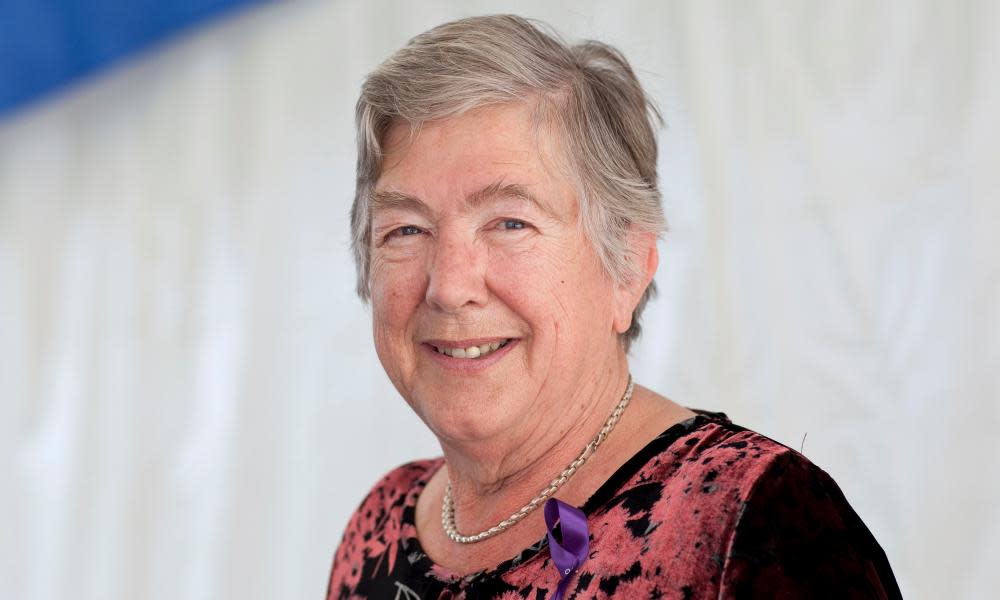Jill Paton Walsh obituary

Jill Paton Walsh, who has died aged 83, was for many years best known as a children’s author, before also taking up writing for adults, most successfully with Knowledge of Angels, shortlisted for the 1994 Booker prize. Later she added to Dorothy L Sayers’s Lord Peter Wimsey novels.
Writing almost a book a year for children from 1966 to 1995 – adventure stories with a strong sense of place and often a historical setting – she had an unpatronising literary style and was ambitious about what children would enjoy. She began by writing the kind of books she liked,“dreams of action told in simple narration” which was best suited to children’s literature.
“I needed something intellectual, cheap and quiet,” Jill wrote in an autobiographical essay describing starting her career when she was stuck at home with a difficult baby. Her first books, Hengest’s Tale (1966), set in post-Roman Britain, and The Dolphin Crossing (1967), a second world war story, vividly conveyed their period setting, and were firmly in the tradition of children’s historical fiction set by Rosemary Sutcliff and Leon Garfield.
Several others in the same vein followed, including The Emperor’s Winding Sheet (1974), set at the fall of Constantinople, and A Parcel of Pattens (1983), a moving account of the courageous decision taken by the villagers of Eyam, in Derbyshire, when the plague struck in 1665.
In Goldengrove (1972), Jill pitched to an older audience, with a moving and thoughtful exploration of adolescence, which she continued in a linked title, Unleaving (1976). Strongly influenced by her childhood love of St Ives, Cornwall, and full of literary allusions, Goldengrove and Unleaving were highly regarded at the time; and pushed the boundary of what was thought of as a children’s book.
Jill won the 1974 Whitbread children’s book of the year for The Emperor’s Winding Sheet and the inaugural Nestlé Smarties prize in 1985 for Gaffer Sampson’s Luck, in which James, a new boy in town, makes friends with his housebuond neighbour. She “tithed” her prize money for the latter to charity in a characteristically generous and flamboyant gesture. In the US, she won the Boston-Globe Horn book award 1976 for Unleaving.
Jill published three novels for adults, including Lapsing (1987), which drew on her Catholic upbringing, but they had only a modest success. As a result, she had to self-publish Knowledge of Angels. While there were some positive reviews, many critics seemingly could not shake off Jill’s origins as a children’s writer. Nevertheless, Knowledge of Angels became a big-selling title, shortlisted for the Booker and later an A-level set text, and Jill moved to writing entirely for adults.
Despite having always been a staunch advocate for the very special qualities of writing for children, Jill found she had run out of stories for them, apart from a couple of picture books inspired by becoming a grandmother.
Instead, encouraged into it by her agent, who thought she would make a good crime writer and that it would pay well, Jill produced four detective novels set in a Cambridge college, as a result of which she was asked by the trustees of Dorothy L Sayers’s estate if she could complete a Lord Peter Wimsey novel left unfinished at Sayers’s death in 1957. Thrones, Dominations was published in 1998, and Jill followed it up with three more Lord Peter Wimsey novels of her own.
Born in Finchley, north London, Jill was the oldest child of John Llewellyn Bliss, a radio and TV engineer, and his wife, Patricia (nee DuBern). In 1940 she went to live with her grandmother in St Ives to get away from the bombing during the second world war, and did not return until 1944, after her grandmother’s sudden death.
She went to St Michael’s convent school, Finchley, and then studied English at St Anne’s College, Oxford, where she went to lectures by both CS Lewis and JRR Tolkien. She later wrote: “The example they set by being both great and serious scholars, and writers of fantasy and books for children, was not lost on me.”
She followed her degree with a teacher training course and on graduation became an English teacher at Enfield girls’ grammar school. She married Antony Paton Walsh, a fellow Oxford student, in 1961. They settled in Richmond, south-west London, and had three children.
In the early 1970s, through her writing career, Jill met John Rowe Townsend, himself a distinguished children’s writer and former children’s books editor of the Guardian. She separated from her husband, and she and John quickly established themselves as a leading couple in the world of children’s literature, especially in the US.
Jill was a lecturer at the Library of Congress in Washington in 1978 and she and John were both visiting members of the Center for the Study for Children’s Literature at Simmons College (now Simmons University) in Boston from 1978 until 1986.
Together they regularly attended the Children’s Literature New England conferences. In the UK, from 1985 they lived in Cambridge, entertaining generously in a house they filled with an impressive collection of work by artists of the St Ives school. They married in 2004 following Antony’s death.
Jill was excellent company. Never limited by conventions of age differences, she made deep and lasting friendships. When things did not go so well, she could hold a long-standing grievance. Fiercely intellectual, she was trenchant and honest, with very obvious warmth never far below the surface.
John died in 2014. In February this year she met Nicholas Herbert, Lord Hemingford, and they married in September. He survives her, as do her children, Edmund, Margaret and Clare, and grandchildren, Andy, Catherine and Antony, and her brother, Christopher.
• Jill Paton Walsh, novelist and children’s writer, born 29 April 1937; died 18 October 2020


